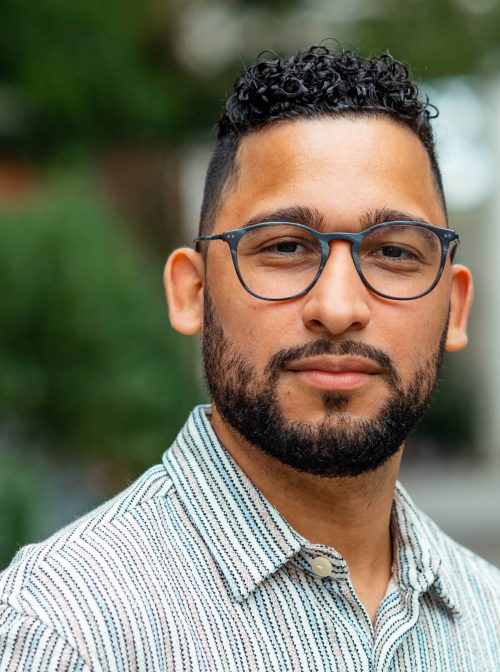We are consumed by violence oftentimes unwittingly, daily. Its various machinations, technologies, structures, and events bind us to particular politics, relationships, and ostensive protections.
For example, those whose bodies, identities, and subjectivities are proximal to the aims and projects of Western modernity are rendered respectable and legitimate, while those on the periphery, or those whose bodies or perspectives run counter to the rubrics of Western liberal humanism are subjected to various forms of elision and social death. Not only am I disconcerted by the parochial frameworks of citizenship that reiterate exceptionalism and assimilative racialized and gendered sensibilities, but also the ease and persistence in which these frameworks are taken up in public discourse.
As a cuir, Humanist/Freethinker who hails from the Caribbean, I have been acutely aware of the vectors of injury and harm that impact me. There are occasions where I have to acquiesce to the dictates of the structure and modulate my desires, thoughts, and behaviors accordingly to be seen.
How might humanist/freethinking communities respond to the challenges and possibilities for addressing violence in this sociopolitical moment?
The endurance of violence invariably takes a substantial toll on me, and I often have to “check myself” to see how much of my integrity I am compromising in the wake of my exploitation and precarity within structures. If we cannot seek protection from a structure, for example, the state or even the hollowed promises of progressive rhetorics, how can we advance more liberatory possibilities for living? Could violence carry a different ontological valence, that is, an alternative interpretation of its material realities and consequences? How might humanist/freethinking communities respond to the challenges and possibilities for addressing violence in this sociopolitical moment? These questions inspire my work as a scholar-practitioner, notably as a Humanist Chaplain in a higher education context.
The allure and gravity of violence were broached during the event, “These Violent Delights: A Humanist Forum on Structural and Social Violence” in April. Sponsored by Generation Common Good, Young Humanists International, Humanists International, UnKoch My Campus, American Humanist Association, and Tufts University Humanist Chaplaincy, panelists representing diverse positionalities proffered insight on the need to recognize complicity in structural and social violence. One of the most rewarding aspects of co-designing this Humanist forum series was a vibrant collaboration through multiple Zoom calls with the panelists. We discussed concerns about interpretations of the missing, the power of relationships across transnational borders, and the bridging of gaps between secular/nontheist organizations.
As implicated subjects, that is, people who operate within oppressive cultural productions, we must be able to witness, examine and understand the ramifications of “the order of things.” Our social relation, through recognition of complicity, can offer a generative dialectic on the modes of communication and interpretation that promote or impede critical interventions of the otherwise. Jasmine Banks, Co-Founder and Executive Director of Generation Common Good and UnKoch My Campus, implored secular communities to consider the genealogies of their ethics and harness the potentiality of coalition building. Moreover, she contended that it is precisely at this moment that humanists and freethinkers should revitalize their commitments to social transformation to countervail the toxic polarization and emboldened white fascism prevalent in our U.S. context. Lily Bolourian, Legal and Policy Director for American Humanist Association expounded these insights through personal narrative and trends of transnational fascism. Junelie Anthony Velonta, Youth Ambassador of Humanist Alliance Philippines, International shared the challenges and implications of cultural diversity within secular communities and experiences in Southeast Asia.
As a Humanist Chaplain, I look forward to co-creating secular spaces that take seriously responsive ethics of care and envisioning new social imaginaries where the constellations of relationality encourage creative and speculative fabulations. I am grateful to Interfaith America and the Building Interfaith America Grant program for allowing me to develop the skills and capacity to facilitate these discussions.
As decolonial feminist scholar, Françoise Vergès astutely states as our charge:
“Sisters and Brothers, Comrades and Friends, we need to learn from this archive and exercise our imagination. We need to free ourselves from the shackles of what has been made normal and natural—violence and war—and which threatens the lives of many for the wealth of a few. We need to free our spirits, our bodies, and our senses to imagine peace, collectively. Let us unlearn to learn so that we learn again. Let us restore the full meaning of touch, of holding the hand of a stranger.”
Anthony Cruz Pantojas is the Humanist Chaplain at Tufts University. Anthony has been recognized with numerous awards, including an Interfaith America Innovation Fellowship, and spearheaded Freedom Making: A Mentorship Fellowship for Emerging Spiritual, Ethical, and Cultural Leaders—an initiative for first-generation students in college. Cruz Pantojas earned master’s degrees in Theological Studies and Leadership Studies from Andover Newton Theological School and Meadville Lombard Theological School, respectively. They hold a Certificate in Humanist Studies from the American Humanist Association Center for Education, where they are the program’s first graduate. Anthony is a doctoral candidate in Cultural Studies. They serve as a board member of the Association of Chaplaincy and Spiritual Life in Higher Education and representative to the International Association of Chaplains in Higher Education. Anthony is endorsed by the Humanist Society as a Chaplain and Celebrant and is also an inaugural Interfaith Leader in Higher Education Council.




